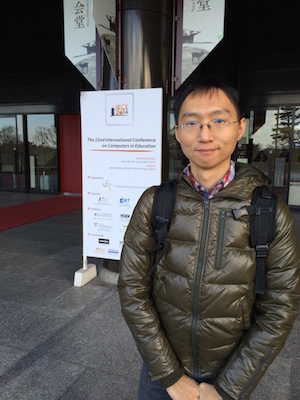
博士副教授
电子邮件:hercycheng.tw@gmail.com
教育经历
2003.09-2009.11台湾中央大学资讯工程学系博士
2001.09-2003.06台湾中央大学资讯工程学系硕士
1997.09-2001.06台湾中央大学资讯工程学系学士
工作经历
2014.08-至今华中师范大学国家数字化学习工程技术研究中心副教授
2013.08-2014.06台湾中央大学网路学习科技研究所兼任助理教授
2009.12-2014.06台湾中央大学网路学习科技研究所博士后研究员
研究方向
数字教室 计算机辅助数学与语文学习 游戏式学习
目前主要负责小学阅读能力评价项目 包括体系发展 平台建置与数据分析
研究成果
-论文
Cheng, H.N. H.*, Yang, E. F. Y., Liao, C. C. Y., Chang, B., Huang, Y. C. Y., & Chan,T. W. (2015). Scaffold seeking: A reverse design of scaffolding incomputer-supported word problem solving. Journal of Educational ComputingResearch, 53(3), 409-435. doi:10.1177/0735633115601598 (SSCI)
Yang, Z.K., Wang, M.*, Cheng, H. N. H., Liu, S. Y., Liu, L., & Chan, T. W.(accepted). The Effects of Learning from Correct and Erroneous Examples inIndividual and Collaborative Settings. The Asia-Pacific Education Researcher.doi:10.1007/s40299-015-0253-2 (SSCI)
Cheng, H.N. H.*, Weng, Y. L., & Chan, T. W. (2014). Computer supported problemposing by annotated expressions: Content-first design and evaluation. Journalof Computers in Education, 1(4), 271-294. doi:10.1007/s40692-014-0019-5
Liao, C.C. Y.*, Chen, Z. H., Cheng, H. N. H., & Chan, T. W. (2012). Unfolding learning behaviors: A sequentialanalysis approach in a game-based learning environment. Research and Practicein Technology Enhanced Learning, 7(1), 25-44.
Chen, Z.H.*, Liao, C. C. Y., Cheng, H. N. H., & Chan, T. W. (2012). Influence ofgame quests on pupils’ enjoyment and goal-pursuing in math learning. Journal ofEducational Technology & Society, 15(2), 317-327. (SSCI).
Liao, C.C. Y.*, Chen, Z. H., Cheng, H. N. H., Chen, F. C, & Chan, T. W. (2011). My-Mini-Pet: ahandheld pet-nurturing game to engage students in arithmetic practices. Journalof Computer Assisted Learning, 27(1), 76-89. (SSCI)
Cheng, H.N. H.*, Wu, W. M. C., Liao, C. C. Y., & Chan, T. W. (2009). Equal opportunitytactic: Redesigning and applying competition games in classrooms. Computers& Education, 53(3), 866-876. doi:10.1016/j.physletb.2003.10.071 (SSCI, EI)
Chang, S.B.*, Lin, C. J., Ching, E., Cheng, H. N. H., Chang, B., Chen, F. C., Wu, D.,& Chan, T. W. (2009). EduBingo: Developing a content sample for theone-to-one classroom by the content-first design approach. EducationalTechnology & Society, 12(3), 343–353. (SSCI)
Chang,B.*, Cheng, N. H., Deng, Y. C. & Chan, T. W. (2007). Environmental design fora structured network learning society. Computers and Education, 48(2), 234-249.(SSCI, EI)
郑年亨*、张立杰、周志岳、陈德怀(2004)藉由提供管理者工具在亚卓市网站上协助建立阶层式学校与班级线上社群。全球华人计算机教育应用学会期刊,2(1),59-71
-专著
Chan,T.W., Kong, S. C., & Cheng, H. N. H.* (2014). Learning Environments inMathematics Education. In S. Lerman (Ed.), Encyclopedia of MathematicsEducation (pp. 57-61), Dordrecht: Springer.
黃政理、鄭年亨、陳德懷(2014)。電腦支援國小數學擬題平台的設計與評估。載於吳昭容、左台益(主編),數學數位學習(3-32頁)。台北市:高等教育出版社
